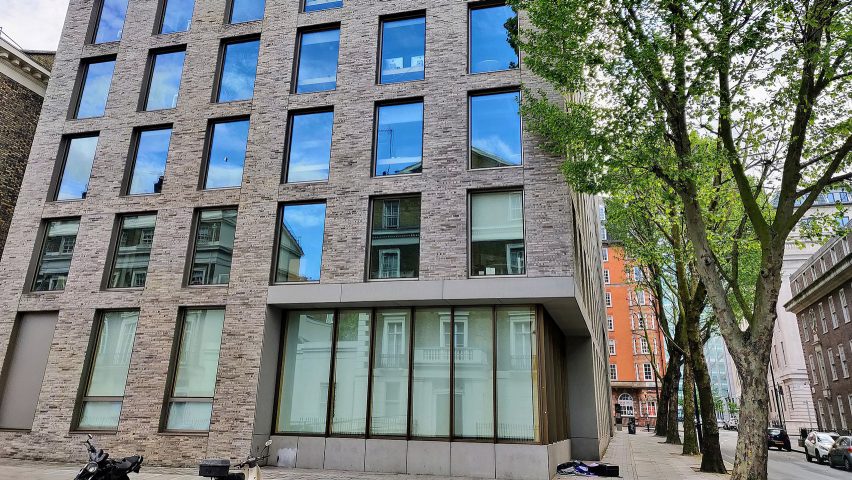Architects and academics including Amin Taha, Vicky Richardson, Peter Murray and Piers Gough have criticised UCL for releasing a report into the toxic culture at the Bartlett School of Architecture in an open letter.
The signatories accuse University College London (UCL), which the Bartlett is a part of, of acting "to preserve its reputation" by conducting a "public spectacle which is masquerading as a disciplinary process".
Last month UCL released an independent report into bullying, harassment, racism and sexual misconduct at the London institution written by legal consultancy Howlett Brown.
"UCL has encouraged students to engage in public shaming"
However, the letter, which was signed by two dozen architects, academics and curators including RA architecture head Richardson, New London architecture founder Murray and architects Taha, Gough, Louisa Hutton and Roz Barr, claims that this decision has started a "witch-hunt" by encouraging "students to engage in public shaming".
"By making the report public before the disciplinary process has been concluded, UCL has encouraged students to engage in public shaming," the letter said.
"Student 'activists' are now demanding that more than 83 members of staff should be sacked for unspoken crimes. UCL has acted to preserve its reputation while subjecting all its staff to an opaque, open-ended 'investigation'."
When the report was released, UCL suspended several members of staff but was unable to share names as internal investigations were continuing.
Following its release, rumours have circulated online about the identities of those responsible for the many reported incidents at the architecture school.
Report "conflates serious accusations" with "trivial claims"
According to the letter, this has led to many "decent and talented teachers" being "blacklisted".
"Instagram activity by a relatively small number of students and former students has led to something akin to a witch-hunt," said the letter. "Anonymous complaints about tutors' reviews sit alongside demands for their sacking."
The independent investigation, which included interviews with more than 300 students and staff, determined that "unforgivable" incidents of bullying and harassment occurred at at the school.
However, the letter also criticised the report for including details of "serious accusations" alongside "trivial claims".
"The Howlett Brown report relies on anonymous and confidential reporting, and conflates serious accusations of sexism, racism and bullying with trivial claims about informal staff-student socialising and studio reviews," it said.
The Bartlett ranked first in the UK for architecture and the built environment, according to the QS World Rankings.
The independent report was commissioned after numerous accusations of sexual and racial harassment were made public by former student Eleni Kyriacou in 2021. Following the report's release, Kyriacou said she felt "vindicated", but that it was only the first phase of reform.
Bartlett director Bob Sheil resigned in response, while the details of the abusive culture were both "both shocking and completely unsurprising", according to many architects.
Read the full open letter below:
Open letter to UCL
We the undersigned are deeply concerned about the blacklisting of staff at the Bartlett School of Architecture following the publication by UCL of the Howlett Brown report in June. We write to express our solidarity with the majority of decent and talented teachers who have been named on social media blacklists inspired by the report.
There are times when institutions need to discipline staff, but UCL has, in a Kafkaesque fashion, suspended staff and embarked on an unnerving and seemingly unending investigation into all staff in which those accused don't know what they are accused of or who has made the accusations.
The Howlett Brown report relies on anonymous and confidential reporting, and conflates serious accusations of sexism, racism and bullying with trivial claims about informal staff-student socialising and studio reviews.
By making the report public before the disciplinary process has been concluded, UCL has encouraged students to engage in public shaming. Student 'activists' are now demanding that more than 83 members of staff should be sacked for unspoken crimes. UCL has acted to preserve its reputation, while subjecting all its staff to an opaque, open-ended 'investigation'.
Instagram activity by a relatively small number of students and former students has led to something akin to a witch-hunt. Anonymous complaints about tutors' reviews sit alongside demands for their sacking. Many UCL students have gone online to defend named staff, but their voices are not appearing in the press.
Discussions about design teaching methods are always useful, but this wave of denunciations is not constructive. A culture of fear and unbalanced press reports has led to a situation in which longstanding campaigners against 'the crit' are monopolising a very narrow discourse. ‘The crit' process is important in preparing students for the practice of architecture. The plurality and creative tension implicit in the discipline can only really be explored through public exhibitions and review. Despite uncritical media reports of architecture's ‘toxic culture' the vast majority of crits are educational, productive and supportive.
Cultivating fear and recriminations will not resolve the problems that exist at UCL. We call on the UCL management to end this public spectacle which is masquerading as a disciplinary process. The Howlett Brown debacle is not consistent with the principle of 'innocent until proven guilty' nor is it consistent with a culture of open and honest discussion traditionally associated with all good universities and art schools.
Signed:
Vicky Richardson, Penny Lewis, Alan Dunlop, Lorens Holm, Roz Barr, Austin Williams, Amanda Baillieu, Gian Luca Amadei, Brendan Woods, Paul Finch, Piers Gough, Shelagh McNerney, Bernhard Blauel, Tim Ronalds, Ab Rogers, Vanessa Norwood, Amin Taha, Sandra Denicke-Polcher, Darryl Chen, Steve Jensen, Louisa Hutton, Peter Murray, Ben Addy, Kenneth Frampton

